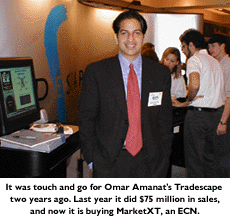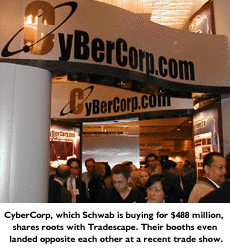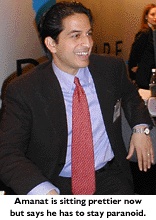|
Street courts day trade firms
|
 |
February 25, 2000: 10:56 a.m. ET
Direct-access company Tradescape.com attracts attention
By Staff Writer Alex Frew McMillan
|
NEW YORK (CNNfn) - In late 1997, Omar Amanat was sleeping in the Manhattan office-storeroom he'd rented from a Mexican investment bank. He was working for no pay. All his backers had pulled out. He and his father had lost $1.5 million of their own money in a year, were losing $150,000 a month, and it wasn't clear whether his start-up would fly.
"This is all our personal money," the Tradescape.com CEO said at an online-trading expo held in New York last weekend. This is still yesterday in his mind, the tension still palpable. "There is a big difference between using V.C. money that you blow and spending your own personal money."
Since then, Amanat has built Tradescape into a direct-access brokerage that posted $75 million in revenues last year. Its 3,000 traders trade 40 million shares a day, making it the biggest day-trading company in the country. It plans to go public this summer or in the third quarter.

That's if it's not bought out by then. Direct-access brokers are attracting Wall Street interest, and Tradescape has had big names sniffing around. Buyout firm J.W. Childs Associates and Japan-based Softbank invested $40 million in Tradescape last year. This month, Charles Schwab bought a competitor for half a billion dollars.
But Amanat and his father are still majority owners of Tradescape. Whether this year brings an IPO or a buyout, it's a far cry from two years ago. "The only thing I knew was that we weren't going to fail. I was just so doggedly determined we would do this."
Direct-access brokers are big business
Mainstream brokerages are attracted to the software that direct-access companies have created for active traders. They fear losing the most profitable segment of the market.
That's why Charles Schwab this month paid $488 million to buy Tradescape's direct-access competitor CyberCorp. Day traders make thousands of trades a year, with huge commissions. The average Schwab customer makes eight trades a year. The average CyberCorp customer makes almost six trades a day.
Tradescape has similarly attractive traders. In June 1999 it bought Houston-based Momentum Securities, which has 10 day-trading offices, with Softbank's help. It continued its expansion this month, buying electronic communications network MarketXT for $100 million in stock.
Softbank, which sometimes asks Amanat to consult, sent him to do due diligence on MarketXT. Tradescape wound up buying it.
The deal looks promising
The deal guarantees liquidity for the ECN, which had disappointing volumes. It gives Tradescape a place to trade stock cheaply. MarketXT's chief, Michael Sanderson, former CEO of Instinet, signed on as Tradescape chairman.
Analysts say the move is promising. "It's very interesting," said Greg Smith, with Hambrecht & Quist. "You're pairing an ECN with a ton of order flow. In the progression of the market, it makes sense." It's cheap, fast trading system with cheap, fast trading platform, cutting out the middlemen if need be.

It puts Tradescape in a position to profit from both "sides" of a trade. "Owning the customer on the front end and the execution on the back end gives you a lot of power," Smith said.
Suddenly appearing on the scene
Tradescape has developed fast. Amanat grew up in Montville, N.J. His father, a Columbia biochemistry doctorate, ran a lab for 20 years, but sold it to trade options and futures from home.
Amanat got interested in Wall Street's original glory days. He went to Penn's Wharton School as an undergrad, then started trading derivatives at Citibank. He moved to Datek, which was developing its day trading.
It hired Ivy League grads and trained them to trade, fronting them the money for a share of profits. But Datek started to focus more on its online brokerage and ultimately sold its day-trading unit, which ran into regulatory problems.
Amanat moved briefly to Houston, where he and CyberCorp founder Philip Berber developed software with day-trading company Block Trading. That partnership fell apart when Block's money backed out. It subsequently went bankrupt.
Berber took the code he'd been writing, and Amanat returned to New York. "Only 15 percent of software is actually writing code," he likes to say. The rest takes a trader's knowledge and product development, he said.
He started Tradescape with a college buddy. A third partner was to pay $330,000 for an equal stake but pulled out. Amanat's father bought in. Amanat's friend forced him to buy him out, saying he had no say in a family business.
The "third generation" of online broker
But Tradescape did design software for very active traders, and Amanat recruited his old day-trading colleagues from Datek. Thanks to their defections, the tide started to turn at the start of 1998.
Tradescape's technology is aimed at full-time traders who rapidly trade large blocks of stock. They need quick execution, the best price and advanced stock-tracking tools. Companies like it are the "third generation" of online broker.
E*Trade started the first wave, taking trading online. But they have the overhead of big marketing budgets and accept payment for order flow, routing trades to certain market makers.

"The technology really only replaced the broker or a telephone," Smith wrote. The Internet serves as an e-mail order-entry system, he added.
The second generation gives customers direct market access, meaning they can route trades straight to the market. Datek Online does that with The Island ECN, which it owns. But second generation brokerages typically link to one ECN.
The third generation, like CyberCorp, Tradescape, Tradecast and ProTrader, link to all. They let a trader route the trade and have smart-order-routing software that searches for the best price if told to.
Think of second generation brokers as stick shift cars, Smith wrote, and third-generation broker as automatics that can be driven stick if need be.
Wall Street playing catch up
"Wall Street has been blind-sided by the evolution of technology in this sector," Amanat said. "Now they're trying to play catch up."
Schwab spent $488 million rather than scurry for a year or two to develop the software and customers, Tom Carter, an online-brokerage analyst with U.S. Bancorp Piper Jaffray said. Faced with missing out on active traders, "it's not a big deal to justify a purchase like this."
Day trading has a reputation marred by reports showing most day traders lose money and of day trading companies' repeated run-ins with regulators, most recently over margin requirements. On Thursday, a senate hearing alleged numerous flaws at day-trading companies.
But analysts say companies like CyberCorp and Tradescape show Wall Street has warmed to some developments in day trading. More brokerages may buy or build direct-access software, they say.
Tradescape has low commissions, $1.50 on 100 shares, and wants to build a larger audience online and close its offices. It is developing software for mainstream customers. It doubled its accounts by offering Internet trading, with a $10,000 minimum balance.
Amanat still doesn't take a salary. But his net worth is, "depending on how you count that day, anywhere from $500 million to zero."
Still, the tension hasn't gone. His software head start won't last long if he sleeps on it.
"The best businesses are the ones that are the most paranoid," he said. "And we are the most paranoid firm on Wall Street." 
|
|
|
|
|
 |

|

